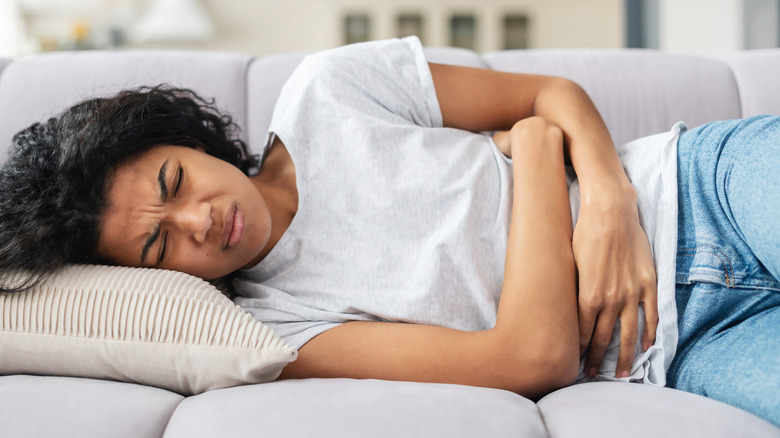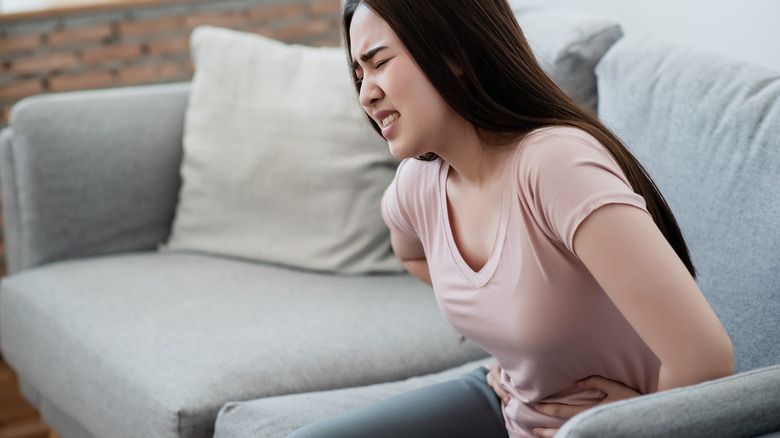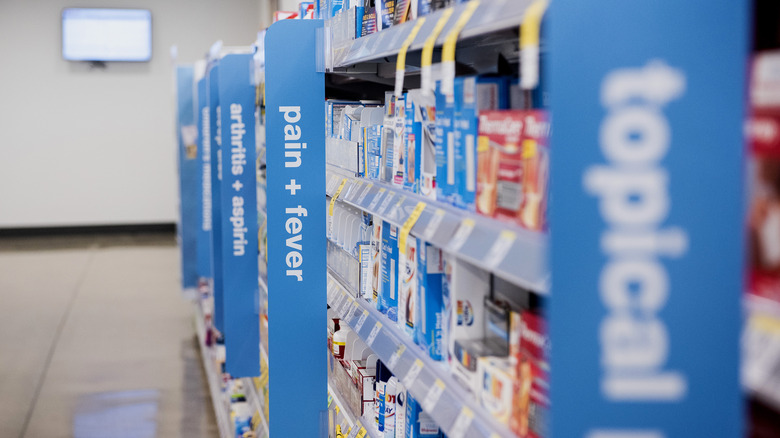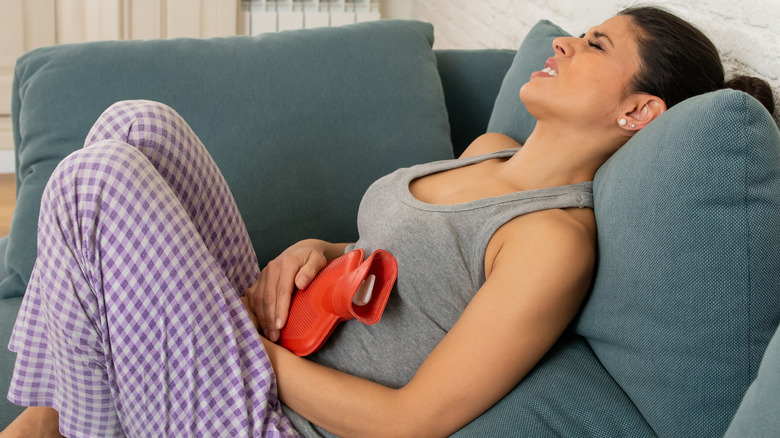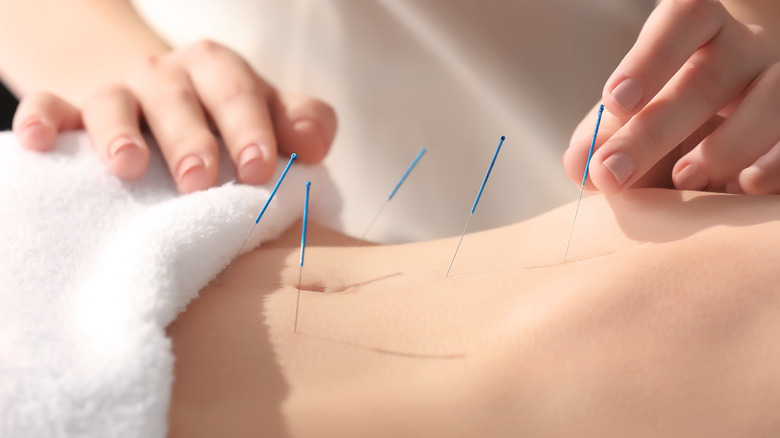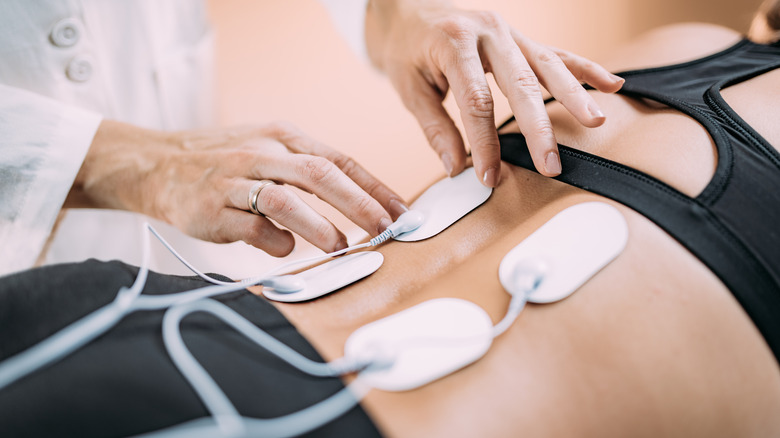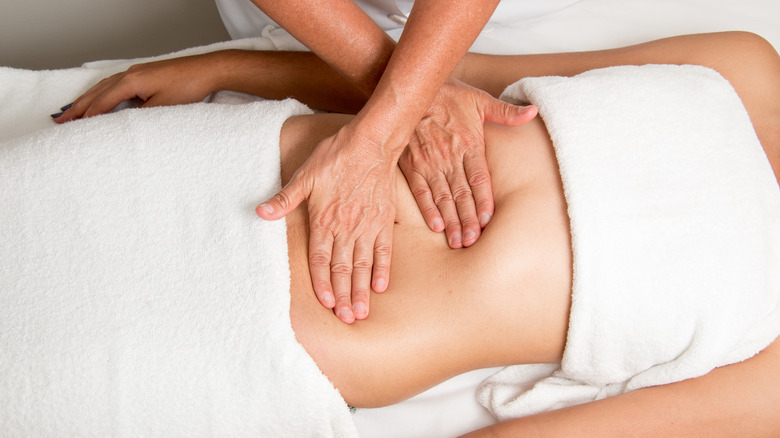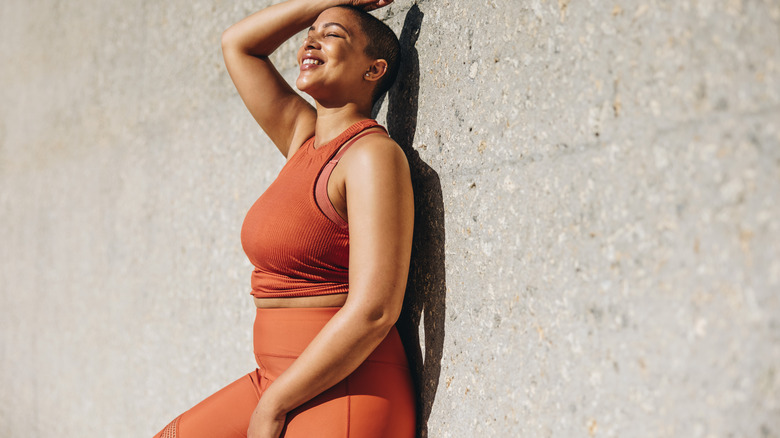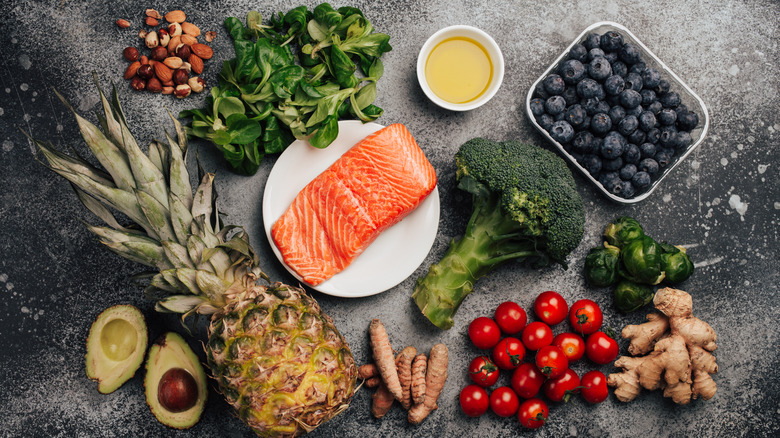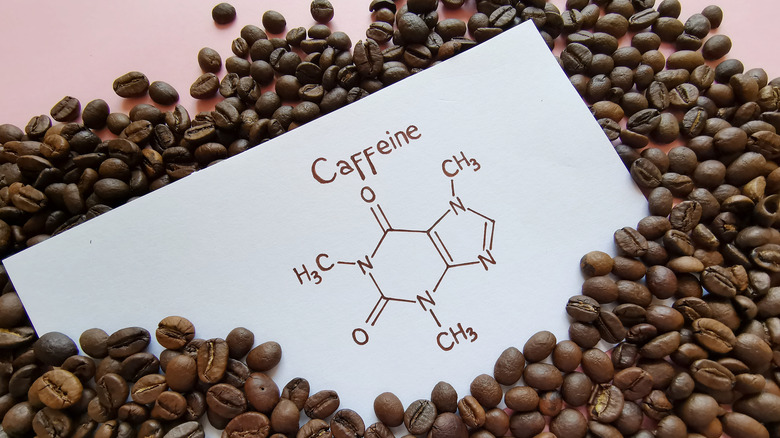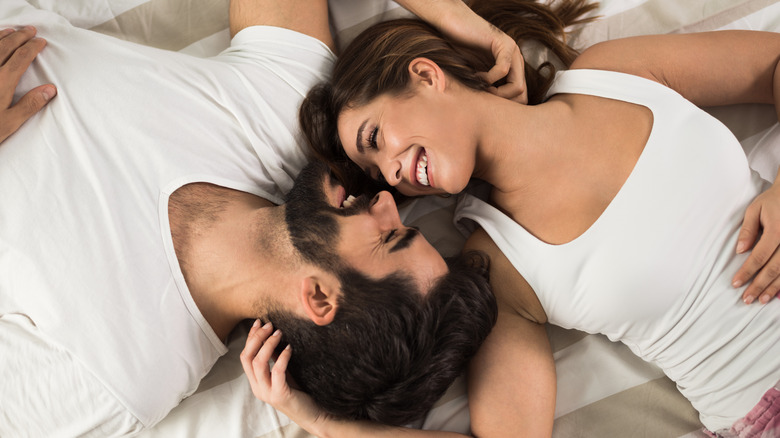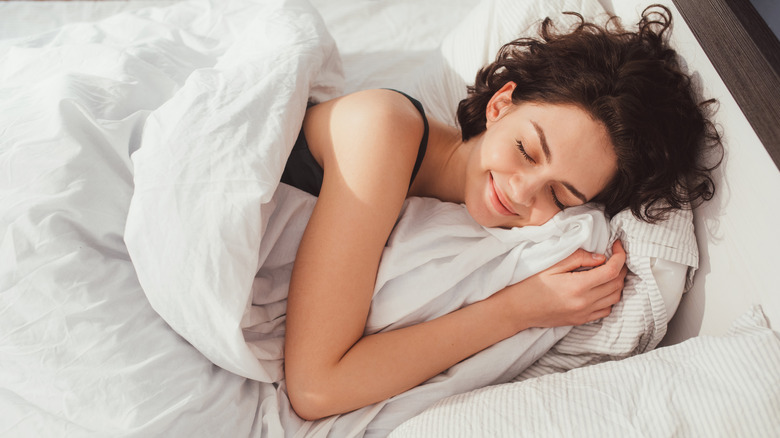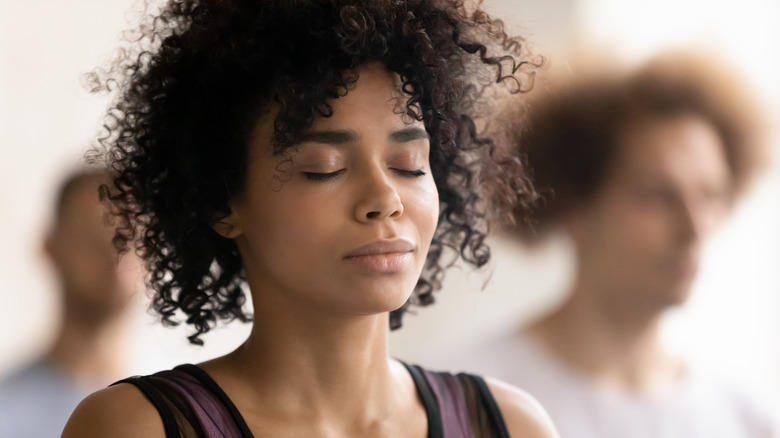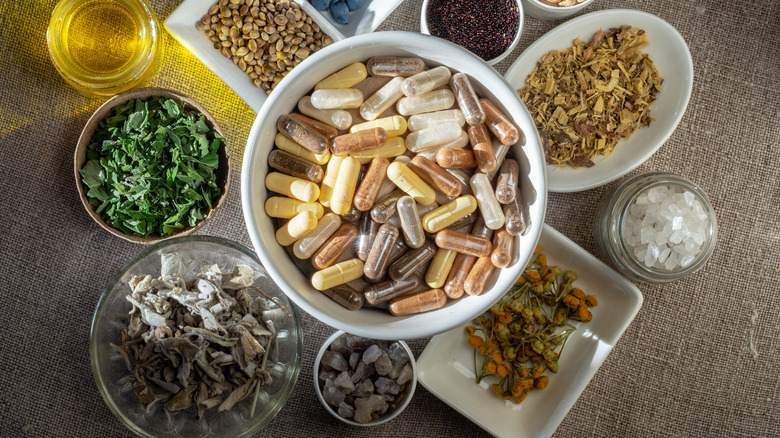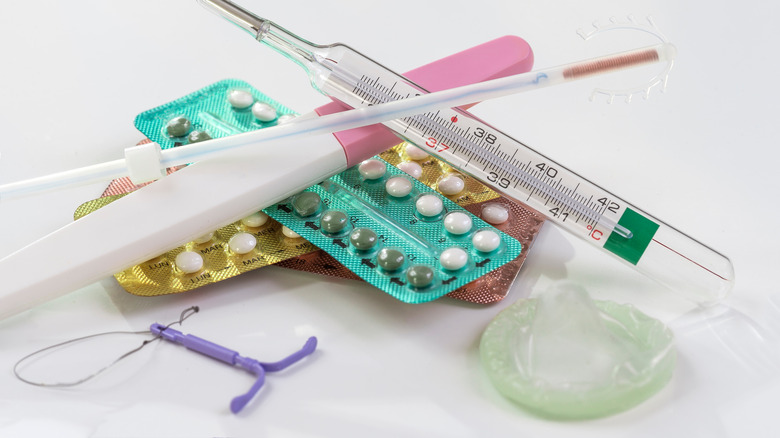What You Should Be Doing To Relieve Your Menstrual Cramps
Every person with a uterus knows what it's like to deal with menstrual cramps. According to the Mayo Clinic, these throbbing, dull, sharp, or achy pains in your lower abdomen let you know that your period is on its way. Menstrual cramps usually last through the first few days of your period and then let up in the later stages.
The blood you expel during your period is actually the lining of your uterus, which sheds every cycle unless a fertilized egg implants (via Planned Parenthood). Chemicals called prostaglandins create uterine contractions, which help expel the uterine lining (per Mayo Clinic). These contractions are what cause your period cramps, and they continue until the uterine lining is shed each month. Higher levels of prostaglandins have been associated with more painful period cramps.
Menstrual cramps are a painful monthly nuisance. However, there are a variety of simple things you can do to find relief.
What's normal and what's not
Before we jump into all the ways that you can treat your period cramps at home, it's important to clarify what's normal and what's not. First and foremost: severe period cramps are not normal, according to the Cleveland Clinic. Many people with a uterus believe that severe pain on a monthly basis is just what having a period is like. But severe menstrual cramps are often a sign of an underlying disease that needs to be properly treated on its own. In such cases, the cramps are known as secondary dysmenorrhea (primary dysmenorrhea are mentrual cramps not caused by an underlying disease). The most common causes of secondary dysmenorrhea are endometriosis, fibroids, adenomyosis, pelvic inflammatory disease, and cervical stenosis.
So, what's normal period pain versus severe period pain? Normal period cramps are uncomfortable but not debilitating. If you're missing school or work because the pain is so bad, that's not normal. Though some nausea, diarrhea, and even vomiting can be part of a normal menstrual cycle, if these symptoms are severe, that's is cause for concern. A meta analysis of studies on severe menstrual pain found that anywhere between 2% to 28% of women experience pain so intense that it interferes with their daily life (via Epidemiologic Reviews). If you fall into this category, you should visit your doctor for an exam or other testing.
Treating menstrual cramps with over-the-counter medication
Those with painful cramps might find relief from taking pain relievers like ibuprofen (Advil, Motrin) or naproxen (Aleve), according go the Mayo Clinic. One study that compared the effectiveness of non-steroidal anti-inflammatory drugs (NSAID), acetaminophen, and a placebo found that NSAIDs were much better at relieving menstrual pain than a placebo or acetaminophen (via The Cochrane Database of Systematic Reviews). The researchers behind the study posited that these results reflected the fact that NSAIDs prevent pain by preventing the production of prostaglandins. Since prostaglandins are responsible for the uterine contractions that cause period cramps, it makes sense that NSAIDs would be more effective at preventing pain.
As the study notes, it's important to be aware of the possible side effects caused by any over-the-counter medication, so be sure to read the label carefully. It's also important to follow the dosing instructions (via Healthline). When you're in a lot of pain it may be tempting to take a higher dose or take the medication more often, but this can lead to serious side effects.
Using heat therapy for period cramps
According to Self, heat therapy is one of the most effective ways to treat menstrual cramps on your own. Dr. Jessica Shepherd, an assistant professor of clinical obstetrics and gynecology at The University of Illinois College of Medicine at Chicago, explained to Self that the heat helps relax the muscles in your uterus, which can calm down the cramping that's causing pain.
Heat therapy can be applied in several different ways — a heating pad, a hot washcloth, standing in a hot shower facing the water, or soaking in a hot bath. Though it's commonly thought that you shouldn't take a bath during your period, Medical News Today says this is actually a myth. Taking a hot bath on your period is totally safe and will probably make you feel much better. The Cleveland Clinic recommends adding some Epsom salts to your bath for a boost of magnesium, which can also help relieve cramps.
Acupuncture or acupressure can help
Acupoint therapy, which includes both acupuncture and acupressure, is based in traditional Chinese medicine (via Women's Health) — and it may be helpful for treating period pain. One meta analysis of studies on acupoint therapy for period cramps found that these therapies can be just as effective, or even more effective, than NSAIDs (via Medicine).
Acupuncture involves inserting tiny needles into several specific points in the body, while acupressure involves massaging these same specific points (per Women's Health). The practices are based in the belief that energy, called qi, flows through the body, and when the qi gets stuck, pain and disease result. Acupuncture and acupressure are used to restore the proper flow and balance of energy.
From a scientific standpoint, acupuncture and acupressure increase blood flow to the pressure points, which can assist with healing and pain relief. Lisa M. Bartoli, an osteopathic doctor and fellow at the Beth Israel Medical Center's Continuum Center for Health and Healing, told Women's Health that acupuncture and acupressure can relieve menstrual cramps by increasing blood flow to the uterus, which helps calm down the contractions that are causing pain. So, if you're willing to try something a bit more alternative, acupoint therapy might be just what you need.
TENS therapy can ease cramps
Transcutaneous electric nerve stimulation, or TENS therapy, has long been a go-to for pain relief, according to Today. In TENS therapy, a small device is placed on the skin at the site of the pain. That device sends gentle electrical signals through the skin, which stimulates the nerves in the area. This prevents those nerves from sending pain signals to the brain, providing actual pain relief. One review of TENS therapy for menstrual cramps found not only that TENS therapy was effective at reducing pain, but that users reported a reduction in their other period symptom and a higher quality of life during menstruation (via the International Journal of Women's Health). Additionally, the people using TENS therapy reported that they needed less over-the-counter pain medication to manage their cramps. There are several brands of portable TENS devices available on the market, according to Medical News Today.
Try an essential oil massage
Several studies have explored whether massaging your abdomen with essential oils can help relieve menstrual pain. One study found that abdominal massage with a mixture of lavender oil, sage oil, and rose oil in an almond oil base significantly reduced the pain of menstrual cramps (via The Journal of Alternative and Complementary Medicine). Another study, published in the medical journal Evidence Based Complementary & Alternative Medicine found that a mixture of cinnamon, clove, rose, and lavender essential oils in a base of almond oil significantly reduced not only menstrual pain but heavy bleeding as well.
Giving yourself an essential oil massage at home is relatively easy. According to Healthline, you'll need to choose the essential oils you want to use, then add a few drops of each to a "carrier oil." A carrier oil dilutes the essential oils a bit and makes them easier to spread on your skin. Common choices include almond oil (which was used in most of the studies), avocado oil, coconut oil, and high-quality extra virgin olive oil. Once you've mixed essential oils with the carrier oil, massage the mixture onto your lower abdomen. Do this self-massage at least once per day during the week before your period starts.
Get moving!
When you're on your period, exercising is probably the last thing you want to do. However, many doctors agree that getting active can significantly reduce your period pain. Dr. Gustavo Rossi, an ob-gyn at Virginia Hospital Center in Arlington, told WebMD that exercise helps ease cramps because it releases natural pain relievers called beta-endorphins in the body. Exercise also helps break down prostaglandins, the hormone-like proteins that cause uterine contractions and create period cramps. So, exercise is a double whammy against menstrual pain. According to experts, aerobic exercise is best for menstrual pain, and consistency is important. Paula Castano, MD, an assistant clinical professor of obstetrics and gynecology at Columbia University College of Physicians and Surgeons in New York, told WebMD that "The important thing is that you do it at least three times a week, for 30 minutes at a time." So, get out for a walk or a run, take a swim, or hit up a group exercise class. Invite a bestie who can encourage you to get out of bed when you're dragging.
Add some anti-inflammatory foods to your diet
According to the Mayo Clinic, prostaglandins not only cause uterine contractions, they also increase inflammation in your body. That's why many doctors recommend an anti-inflammatory diet during menstruation, per Insider. Foods that may help reduce inflammation and ease period pain include leafy greens, ginger, turmeric, and foods high in omega-3 fatty acids like salmon, sardines, flaxseeds, and walnuts. Ensuring you're getting enough magnesium is also important to help relax your uterine muscles (via Mind Body Green). Foods such as nuts, spinach, soybeans, and halibut can boost your intake. To satisfy the sugar cravings many of us get, you can partake in some dark chocolate, which is also packed with magnesium.
Additionally, your anti-inflammatory diet should include a balanced mix of B vitamins and Vitamin E. B vitamins help reduce cramping and muscles aches, and also increase magnesium absorption. Vitamin E has anti-inflammatory properties, so it helps reduce the systemic inflammation that happens during your period. Potatoes, bananas, beans, peas, fortified cereals, and lean proteins — especially pork and chicken — are great ways to load up on B vitamins. Almonds, fortified cereals, spinach, broccoli, and sunflower seeds are some great sources of Vitamin E. Though dietary changes not work for everyone, adding in more anti-inflammatory foods is a low-risk suggestion that might pay off big-time.
Try skipping the lattes and energy drinks
The fatigue that some people experience while on their period can make caffeine feel like a necessity. However, caffeine could be making your period pain worse while it eases your fatigue. The American College of Obstetricians and Gynecologists' official recommendations for easing PMS symptoms includes avoiding caffeine, though research on the subject is mixed. For instance, one 2016 study found that caffeine intake had no impact on PMS symptoms, including period cramps (via The American Journal of Clinical Nutrition).
Still, there are reasons that doctors may still recommend cutting your caffeine intake during that time of the month. Endocrinologist Rocio Salas-Whalen told Insider that caffeine causes your blood vessels to narrow, which "can further worsen cramps during your period." As Mind Body Green points out, every body is different, and some may respond more noticeably to caffeine than others. It may be worth a try to scale back on your caffeine intake at during that time of the month to see if it brings you some relief.
Get busy with your partner or yourself
For many people with a uterus, the idea of getting busy during that time of the month is a turnoff. However, research shows — and doctors agree — that having an orgasm can significantly reduce period pain. A massive study sponsored by the sex toy brand Womanizer and the menstrual cup brand Lunette provides some illuminating information about the benefits of orgasming during your period. A whopping 90% off the participants in the study, which has been dubbed the #menstrubation study, reported that orgasms reduced their period cramps, and 85% said that they would continue to use masturbation as a pain relief technique during their periods. Of those people, 31% said that regular masturbation during their period significantly reduced their menstrual pain.
Dr. Maureen Whelihan, an obstetrician and gynecologist, told Women's Health that "Sex helps with everything!" She explains that orgasms release both oxytocin and dopamine, which help you feel great after your orgasm. Whelihan adds that orgasms also increase the amount of blood flow to the uterus, which helps reduce cramps. But there's one important caveat: If you're orgasming via vaginal sex with a male partner, they should wear a condom. Sperm triggers the release of prostaglandins, which make cramps worse. So however you choose to orgasm, doing so might provide significant pain relief.
Focus on sleep
We all know that getting enough sleep is important, but did you know it's even more important when you're on your period? According to the Sleep Foundation, the hormone fluctuations right before your period can really mess with your sleep cycle. Some people experience insomnia, while others are excessively tired and want to sleep all the time. Researchers haven't figured out why the menstrual cycle disrupts sleep so much, but there are some plausible theories. For instance, one study found that higher levels of progesterone during the premenstrual and menstrual phases of a person's cycle were associated with more sleep disruptions, which could lead to excessive fatigue (via Sleep Medicine).
The Sleep Foundation also points out that many people experience sleep disruptions because of the physical symptoms of menstruation. Some have trouble sleeping because of painful period cramps. Others experience heavy bleeding and may have to wake up to change their tampon or pad.
What does poor sleep have to do with your period pain? Dr. Jamil Abdur-Rahman, an ob-gyn and the chairman of obstetrics and gynecology at Vista East Medical Center told Self that when we don't get enough sleep, our bodies produce extra cortisol, the hormone behind stress. This can cause hormone imbalances which lead to more painful periods. So, focusing on sleep hygiene is super important during your period.
Chill out
According to the National Institutes of Health (NIH), stress before or during your period might make your menstrual symptoms worse. A study conducted by the NIH found that people who reported feeling stressed in the weeks leading up to their period "were two to four times more likely to report moderate to severe symptoms than were women who did not feel stressed." These women were also more likely to report abdominal cramping as one of their moderate to severe symptoms. Another study had similar results, and also found that stress prior to ovulation had a larger impact on period pain than stress right before menstruation, which suggests that stress throughout the month can play a factor in painful cramps (via Occupational and Environmental Medicine).
It follows, of course, that learning to manage your day-to-day stress can play a role in managing your period pain. Some of the Cleveland Clinic's suggestions for stress management also work for dealing with period pain: eat a balanced diet, exercise regularly, and avoid caffeine. They also recommend engaging in a mindfulness practice, quitting nicotine, learning to set appropriate boundaries and expectations, and changing situations in your life that continually cause stress.
Supplements and herbal remedies to try
If you want to avoid pharmaceuticals but aren't finding relief from your period pain, then supplements and herbal remedies might be the answer. Some of these natural remedies interact with other medications, so it's important to have your doctor weigh in before adding one to your routine (via WebMD).
According to WebMD, taking magnesium, essential fatty acids, and/or St. John's Wort may help to relieve period pain. Magnesium helps by relieving uterine contractions and reducing inflammation. Dr. Ernst Schaefer told WebMD that essential fatty acids like Omega-3 reduce inflammation, which also helps reduce menstrual cramps. St. John's Wort has long been used as a natural remedy for relieving stress and anxiety. Since stress is thought to play a major role in period pain, taking this supplement might help reduce both your stress and pain.
According to Verywell Health, herbs like ginger, fennel, pine bark extract, and the Chinese medicine Dang Gui Shao-Yao San may provide relief from menstrual cramps. Ginger has anti-inflammatory properties, and it can reduce the levels of prostaglandins in your body. Fennel contains a compound called anethole, that helps reduce muscle spasms, which can help relieve uterine contractions. Pine bark extract, which can be purchased under the brand name Pycnogenol, has anti-inflammatory properties and lowers prostaglandin production, according to the brand's website. In Taiwan, the herbal medicine Dang Gui Shao-Yao San is often prescribed for menstrual cramps because it acts as an anti-inflammatory and sedative. The traditional medicine is a mix of two herbs: Angelica sinensis and peony powder.
Consider hormonal birth control
For many people with severe menstrual cramps, hormonal birth control is the only thing that provides adequate and consistent relief. Dr. Meredith Warden, an ob-gyn at the University of California and a contributor to Bedsider, explains that birth control helps relieve menstrual pain by changing the uterine lining. When the uterine lining is thick, it takes more contractions to shed it fully. Hormonal birth control makes the uterine lining thinner, which leads to less uterine contractions and reduced cramping.
Warden also says that skipping your period entirely is a safe option. Instead of stopping your hormonal birth control or taking placebo pills once a month, move on to the next cycle of contraceptives and skip your period entirely. When you continuously take hormonal birth control, the lining of the uterus becomes so thin that there's nothing to shed. So, your period stops. The Mirena IUD, a hormonal birth control device that's implanted into the uterus, often stops your period as well.
Even if you don't skip your period, hormonal birth control will probably help reduce your menstrual pain. According to Verywell Health, studies have shown that combination birth control pills, the NuvaRing, the Nexplanon implant, and the Patch reduce period cramps even when not used continuously.

